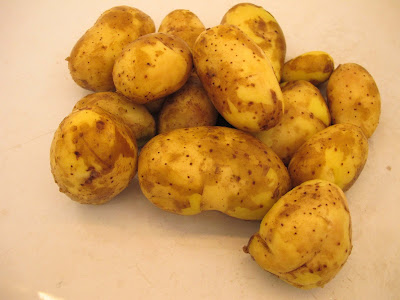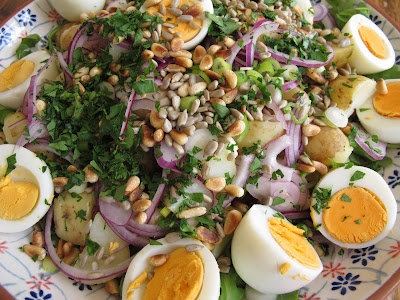Today I’ll wear my nutritional therapist hat in the kitchen to talk
about what’s been a hot topic in the nutrition world for a while: gut health. It’s not surprising that the subject is
getting so much attention, given that about 80% of our immune system is located
in our gut. It’s in there that trillions of microorganisms reside – what we
call human gut microbiome.
It’s also in the gut that our bodies produce 90-95% of the “feel good”
chemicals, serotonin and GABA. The microbiome protects the gut lining, synthesizes vitamin K and B vitamins, produces enzymes that support the liver etc. A great way to feed our gut bacteria is by including in our diet food that contains prebiotics (which feeds the friendly bacteria) and probiotics (that populate the gut microbiome with friendly bacteria).
You will find prebiotics in things like jerusalem artichokes,
chicory, onions, fennel, apples, raw garlic, raw asparagus, seeds, cooked and cooled potatoes and
under-ripe bananas. Probiotics in natural form can be found
in fermented foods like sauerkraut, kefir, kimchi, kombucha, unpasteurized
cheese, organic raw milk, yogurt, sourdough bread, miso, tempeh, natto and so on.
It’s only recently that scientists started to discover the link between
diet, gut bacteria and immune system. Depending on the food we eat we can directly
feed the friendly bacteria (Lactobacillus
acidophillus, Bifidum bacterium
amongst others) or the pathogenic organisms (fungus, yeast or parasites). So,
keeping our gut healthy is very important to maintain good health. If our gut
bacteria are balanced, our immune system is also balanced. If not, we will
become a lot more susceptible to illnesses and diseases such as colds and flu,
chronic inflammation (Crohn’s disease, psoriasis), allergies, sinusitis, candida
overgrowth etc. Also, sometimes, due to
the excess of antibiotics (which kill the good as well
the bad bacteria), poor diet and stress, people’s microbiome is
compromised.
In order to keep our gut in check, we should have as much diversity as possible in our diet on a regular basis. There are a multitude of ethnic shops in London where we can find vegetables or fruits that we may have never tried before. Try experimenting with different foods. In doing so, you will be creating diversity in your gut microbiome. Think of an abundant colourful garden. But don’t forget my motto: ‘’healthy and happy eating’’, no need to obsess, just be sensible about what you cook and eat. This salad should do the trick.
 |
| Scrub the new potatoes... |
 |
| ...and leave their skins on. |
 |
| Add all the ingredients together... |
 |
| ...pour the kefir and feta cheese dressing over the salad... |
 |
| Enjoy it! |
Potato and egg salad with kefir sauce
serves 4
This salad is a perfect combination
of prebiotic and probiotic food source. See the healthy note below for its
nutritional benefits.
Ingredients
1kg organic new potatoes, scrubbed
and skins on
3-4 spring onions, chopped
1 red onion, sliced
6 organic eggs, boiled and halved
50g sunflower seeds
80g pine nuts, toasted
70g rocket leaves
1 handful fresh parsley, finely
chopped
Sea salt and black pepper
Extra-virgin olive oil, to drizzle
For the dressing
250ml organic kefir (if you can’t
find it, use organic live yogurt instead)
150g organic feta cheese
(unpasteurized, preferably)
Juice of 1 lemon
2 teaspoons English mustard
5 sprigs of fresh dill
1-2 garlic clove
Sea salt and black pepper
Method
In a medium pot, cover the potatoes in cold salted water and bring to a boil, let it cook without the lid for about 15 minutes
or until tender.
Drain and leave to cool.
In the meantime, blend all the dressing
ingredients.
When potatoes are cooler and easy to
handle, slice them in halves or quarters, depending on the size you like.
Transfer them to a big bowl, add the
eggs, red onion, spring onions, pine nuts, sunflower seeds, a handful of rocket leaves and parsley. Pour as much as you like of the dressing over the salad, mixing everything gently. Season to taste.
Serve it on a bed of the remaining rocket leaves with a drizzle of extra-virgin olive oil.
Serve it on a bed of the remaining rocket leaves with a drizzle of extra-virgin olive oil.
This dish is also great to take to
picnics and barbecues.
A healthy note: Cold potatoes contain a lot more starch that is "resistant" to digestion
than hot or warm potatoes. Resistant starch is a prebiotic that feeds
the friendly bacteria in our gut and won't spike your blood sugar levels. But be warned that too much isolated resistant starch can also upset your gut population.
Onions are also a good prebiotic food source.
I have already mentioned about gut health in this post here
and in here
If bloating or
digestive discomfort occurs, reduce your intake of prebiotic foods for a few days and then reintroduce it again.
Milk kefir - the fermented dairy product as well as the water-based one - contains healthy bacteria that promote gut health and supports digestion. It also contains elements that help to boost our immune system such as vitamin B12, biotin and folate. Kefir contains calcium, magnesium and vitamin K2 that help to build bone strenght.
Egg is a fantastic and inexpensive source of protein. It contains
lecithin, which helps the body to break down fat and cholesterol. Egg also
contains biotin, another B vitamin-like compound, which is very important for
the digestion of fat and protein, and is essential for the health of hair, skin
and nails. It is very rich in Omega-3 fats, which prevent diabetes, obesity and
depression.
Till next week!



No comments
Post a Comment